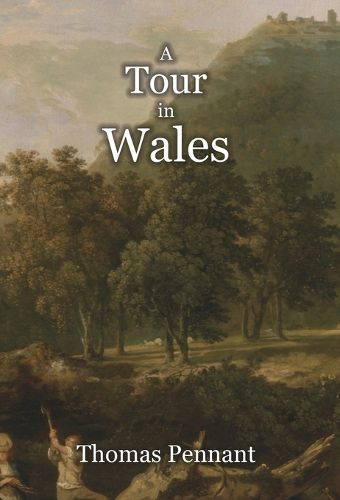Readings Newsletter
Become a Readings Member to make your shopping experience even easier.
Sign in or sign up for free!
You’re not far away from qualifying for FREE standard shipping within Australia
You’ve qualified for FREE standard shipping within Australia
The cart is loading…






This title is printed to order. This book may have been self-published. If so, we cannot guarantee the quality of the content. In the main most books will have gone through the editing process however some may not. We therefore suggest that you be aware of this before ordering this book. If in doubt check either the author or publisher’s details as we are unable to accept any returns unless they are faulty. Please contact us if you have any questions.
Although from North Wales, Thomas Pennant was initially known for his travel writing on Scotland, two well-regarded books about whose natural history were published in the early 1770s. And while his books on North Wales deal with geographical, mineralogical, botanical, ornithological, and ichthyological matters, A Tour in Wales, first publisned 1778, focuses primarily on the history and antiquities of the region. These he treated from a gentleman's perspective, his emphasis on the numerous castles, great Mediaeval families, and their estates or dominions; however, he does not neglect commerce, festivals, or notable structures, like city walls, bridges, or canals. Special attention is paid to Owain Glyndwr's conflict with Henry IV, a subject of enormous interest to the author. The text is bursting with a profusion of names, be it of locations or notable personages; thus, one has to admire Pennant's indefatigable thoroughness, laborious collecting of information, and remarkable erudition-particularly given the sources and tools available at the time, and the general difficulty in accessing books, maps, or documents. His prose is fluid, easy, and extraordinarily amenable, and comes enhanced with twenty-six beautiful engravings, first sketched on the field by Moses Griffiths, his travelling companion. Therefore, it is not surprising that Pennant's volume became the most significant literary reference for subsequent travel writers. His contemporary, Samuel Johnson praised him as a man who 'observes more things than any one else does', while his biographer, W. T. Parkins, considers this his 'best performance'.
$9.00 standard shipping within Australia
FREE standard shipping within Australia for orders over $100.00
Express & International shipping calculated at checkout
This title is printed to order. This book may have been self-published. If so, we cannot guarantee the quality of the content. In the main most books will have gone through the editing process however some may not. We therefore suggest that you be aware of this before ordering this book. If in doubt check either the author or publisher’s details as we are unable to accept any returns unless they are faulty. Please contact us if you have any questions.
Although from North Wales, Thomas Pennant was initially known for his travel writing on Scotland, two well-regarded books about whose natural history were published in the early 1770s. And while his books on North Wales deal with geographical, mineralogical, botanical, ornithological, and ichthyological matters, A Tour in Wales, first publisned 1778, focuses primarily on the history and antiquities of the region. These he treated from a gentleman's perspective, his emphasis on the numerous castles, great Mediaeval families, and their estates or dominions; however, he does not neglect commerce, festivals, or notable structures, like city walls, bridges, or canals. Special attention is paid to Owain Glyndwr's conflict with Henry IV, a subject of enormous interest to the author. The text is bursting with a profusion of names, be it of locations or notable personages; thus, one has to admire Pennant's indefatigable thoroughness, laborious collecting of information, and remarkable erudition-particularly given the sources and tools available at the time, and the general difficulty in accessing books, maps, or documents. His prose is fluid, easy, and extraordinarily amenable, and comes enhanced with twenty-six beautiful engravings, first sketched on the field by Moses Griffiths, his travelling companion. Therefore, it is not surprising that Pennant's volume became the most significant literary reference for subsequent travel writers. His contemporary, Samuel Johnson praised him as a man who 'observes more things than any one else does', while his biographer, W. T. Parkins, considers this his 'best performance'.